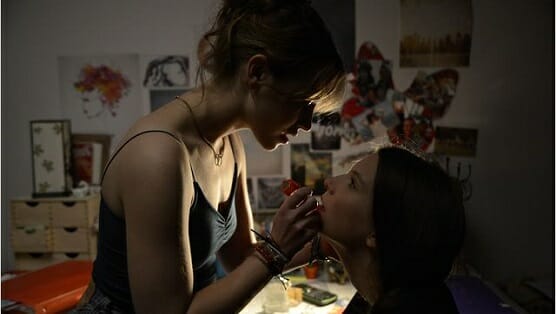Breathe

Nothing’s more effective at shaking a teen out of their monotonous high school routine than the arrival of a new student. That’s the stuff actress/director Mélanie Laurent’s sophomore film, Breathe, is made of: mystery and allure, with generous dollops of adolescent rivalry, sexual awakening and verbal abuse spooned on top. Think of Breatheas a distant European cousin to the fraught teen movies of Larry Clark as well as Catherine Hardwicke’s Thirteen, stories of imperiled youth, loneliness and volatile sentiment. It’s a film about unrequited love—not necessarily romantic love, but confused, ambiguous love, the kind of love that closely resembles a roller coaster ride and leaves people who feel it wrecked.
Breathe anchors its perspective to young Charlie (Joséphine Japy), the very picture of ordinary teenhood by anyone’s standards. Charlie lives with her folks in a sleepy French suburb that’s as quiet and nondescript as she is. Her mother (Isabelle Carré) argues with her father on the regular over matters of marital fidelity; she can only escape their skirmishes at school, where she keeps a low profile while enjoying minor but stable popularity among her circle of friends. They’re good kids, mostly, lovably raucous and totally safe, keeping in stride with the prevailing normalcy of Charlie’s life. But that normalcy turns out to be remarkably delicate: No sooner does out-of-towner Sarah (Lou de Laâge) join Charlie’s class than her mundane existence starts to splinter.
Sarah, returned to France after living in Nigeria with her own mother for several years, is everything Charlie isn’t. She’s spontaneous and worldly. She dresses chic and smokes Nigerian cigarettes. Distill all that into a single word—“cool”—and Charlie’s immediate fascination with Sarah requires no explanation. We empathize with her right off the bat, and Charlie’s classmates are almost as obsessed with Sarah as Charlie is. Guys like her. Girls want to be like her. Anyone who made it through high school probably knows someone like her, too, which ultimately means that Breathe’s dramatic flourishes are as familiar thanks to our personal experiences as they are because we’ve seen them on film before. We know the plot’s trajectory before the film leaves the launch pad.
-

-

-

-

-

-

-

-

-

-

-

-

-

-

-

-

-

-

-

-

-

-

-

-

-

-

-

-

-

-

-

-

-

-

-

-

-

-

-

-








































